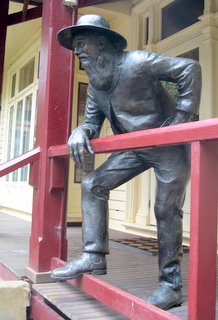
"The Man From Ironbark" is a poem by Australian bush poet Banjo Paterson. It is written in the iambic heptameter.
"Saint Peter" is a well-known poem by iconic Australian writer and poet Henry Lawson. It was first published on 8 April 1893 in The Bulletin.
"A Double Buggy at Lahey's Creek" is a short story by Australian writer and poet Henry Lawson, first published in 1901.It was Lawson's second story to include the character of Joe Wilson; however, chronologically, it is fourth and final in the Joe Wilson series. The story recounts the events that befall Joe Wilson and his family, and which ultimately lead to his buying a double buggy for his wife, Mary.
"Up The Country" is a popular poem by iconic Australian writer and poet Henry Lawson. It was first published in The Bulletin magazine on 9 July 1892, under the title "Borderland." Its publication marked the start of the Bulletin Debate, a series of poems by both Lawson and Andrew Barton "Banjo" Paterson asserting contrasting views of the true nature of life in the Australian bush.
In Defence of the Bush is a popular poem by Australian writer and poet Andrew Barton "Banjo" Paterson. It was first published in The Bulletin magazine on 23 July 1892 in reply to fellow poet Henry Lawson's poem, Up The Country. Paterson's rebuttal sparked the Bulletin Debate, a series of poems by both Lawson and Paterson about the true nature of life in the Australian bush.
The City Bushman is a poem by iconic Australian writer and poet Henry Lawson. It was first published in The Bulletin magazine on 6 August 1892, under the title In Answer to "Banjo", and Otherwise. It was the fourth work in the Bulletin Debate, a series of poems by both Lawson and Andrew Barton "Banjo" Paterson, and others, about the true nature of life in the Australian bush.
"Flag of the Southern Cross" is a poem written in 1887 by Australian bush poet Henry Lawson. The title refers to the Eureka Flag flown at the Eureka Rebellion in Ballarat, Victoria in 1854. It was originally published in Truth, a Sydney newspaper.
This article presents a list of the historical events and publications of Australian literature during 1891.
The Poets of the Tomb is a poem by Australian writer and poet Henry Lawson. It was first published in The Bulletin magazine on 8 October 1892 in reply to fellow poet Andrew Barton "Banjo" Paterson's poem, In Answer to Various Bards.

The Teams is a poem by Australian writer and poet Henry Lawson. It was first published in the Australian Town and Country Journal on 21 December 1889. It was later published in the poet's poetry collection In the Days When the World Was Wide and Other Verses in 1896.
"The Never-Never Country" (1901) is a poem by Australian poet Henry Lawson. It is also known by the title "The Never-Never Land".
"Faces in the Street" (1888) is a poem by Australian poet Henry Lawson.
"The Song of Old Joe Swallow" (1890) is a poem by Australian poet Henry Lawson.
"Song of the Shingle Splitters" (1874) is a poem by Australian poet Henry Kendall.
"How M'Dougal Topped The Score" (1898) is a poem by Australian poet Thos. E. Spencer.
"The Fire at Ross's Farm" (1890) is a poem by Australian poet Henry Lawson.
"A Bushman's Song" (1892) is a poem by Australian poet A. B. Paterson.
"The Roaring Days" (1889) is a poem by Australian poet Henry Lawson.
"A Song of the Republic" (1887) is a poem by Australian poet Henry Lawson. It was the author's first published poem.
"His Father's Mate" is a melodramatic short story by Henry Lawson. It was first published in the 22 December 1888 issue of The Bulletin, and later included in the author's short story collection, While the Billy Boils, and in many short story anthologies. It was the author's first published short story.

